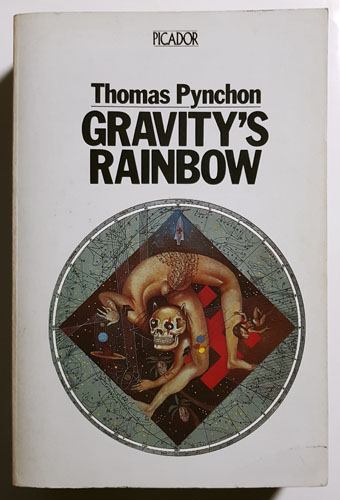
There is nothing in contemporary literature to compare with it, certainly not in English. All the lesser pretenders—John Barth, Richard Powers, David Foster Wallace, Jonathan Franzen, even Don DeLillo—seem small and trivial in the glow of its mad quasar-pulses of brilliance. The risks taken here, in 1973, are so astonishing in retrospect largely because of everybody else’s incapacity to match them.
The burning question will always be: for whom was Pynchon writing? There was no ready readership for a book composed of such disparate, off-putting materials and crazy shifts of tone.
Yet Gravity’s Rainbow created one from scratch, the way Einstein created a new image of the universe and the universe rearranged itself accordingly.
Julian Murphet on Thomas Pynchon’s magnum opus which was published 50 years ago today. Happy birthday, Rocket book. I finally tackled the thing a couple of years ago, and wrote about the experience here.
Previously on { feuilleton }
• The Late Show: Thomas Pynchon
• Esoterica 49
• Pynchonian cinema
• Going beyond the zero
• Pynchon and Varo
• Thomas Pynchon – A Journey into the Mind of [P.]

Gravity’s Rainbow is definitely the weirdest novel I’ve ever read.
Weird but wonderful if you can get past the Giant Adenoid. It took me a long time to break through the Adenoid Barrier.
Without wanting to take away anything from Gravity’s Rainbow, which is easily one of the greatest novels of the past five decades, there *is* some precedent for it, namely William Gaddis’s The Recognitions. In fact, I can’t tell you how relieved I was when I read that novel (after having read GR a few times) and realized that Pynchon hadn’t actually invented everything out of whole cloth!
Beyond which, Pynchon supposedly said that “the Cornell seminars” (I assume he means Nabokov’s) “taught him the way of crafting a fiction around one central metaphor that unifies its sometimes very disparate and complex elements of character, imagery, and action.” See “That Which Has Seemingly Influenced Thomas Pynchon” at .
But again, that’s not to try and diminish GR or Pynchon in any way, just to show that genius also has its ancestry.
Yeah, I don’t really think it’s as sui generis as that article makes out but I posted the quote anyway as an attention-grabber. Pynchon’s own novels are obvious precurors even before you start looking elsewhere. Same with James Joyce and Ulysses, the big book is preceded by two smaller ones which explore some of the same territory before going all-out.
This is how defective and dysfunctional I was and, I suppose, still am: Spent approximately seven weeks between low level jobs the year after graduating college reading it. Got to say, that as a (again) defective human being, I savored the prose. Yet what really stuck was the revelations about Peenemünde. Planted a seed that would start blooming for a decade or two. Now, I’m at least skeptical of just about every official announcement, weather forecasts included.